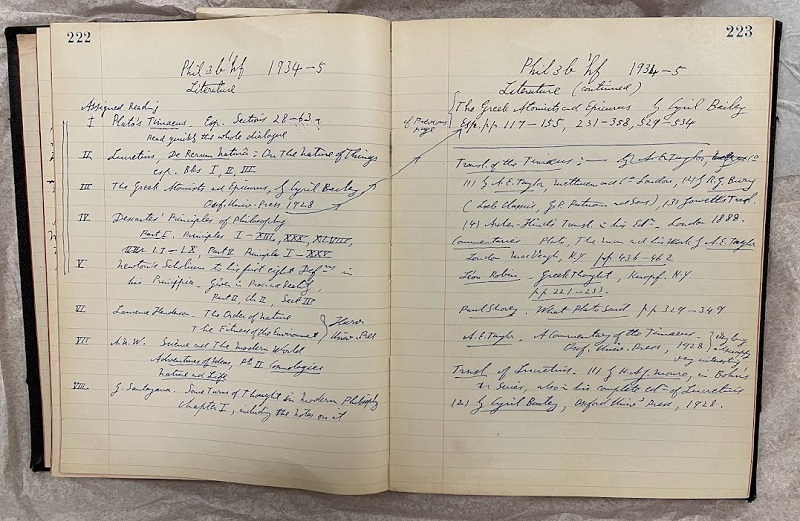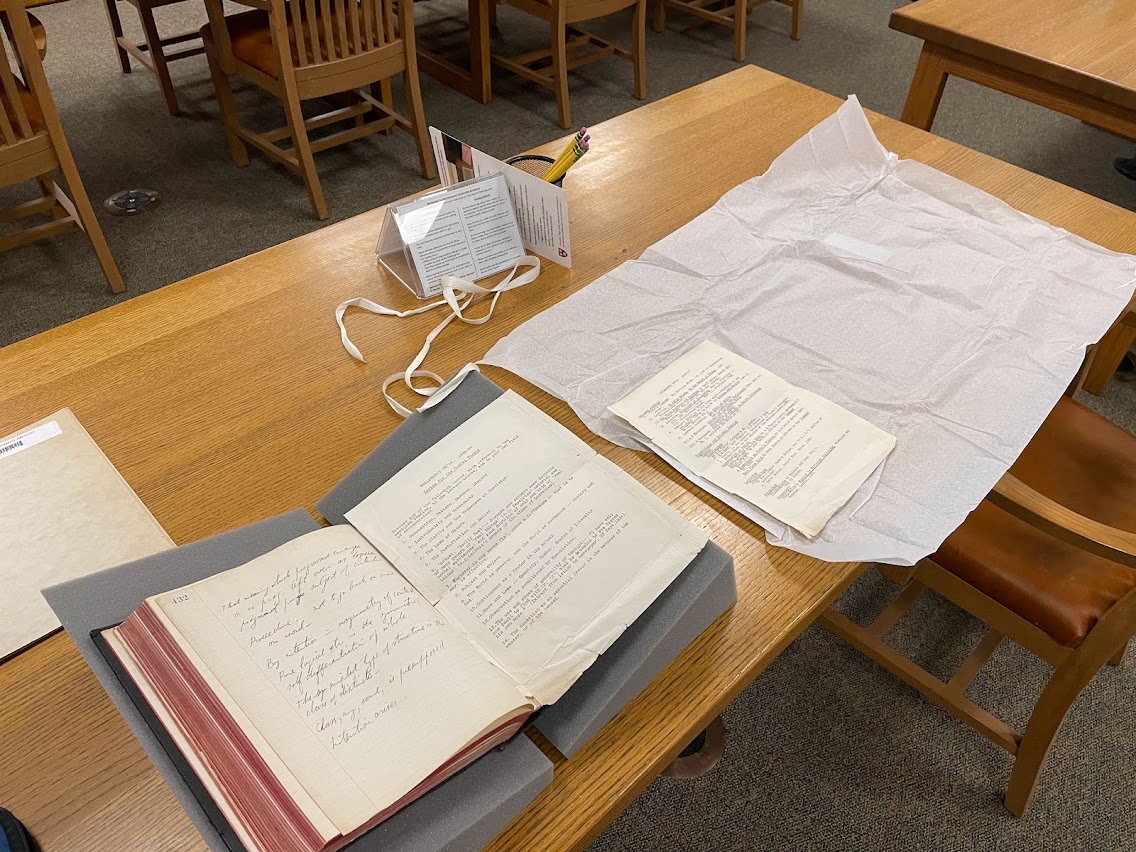STUDENT NOTES FROM WHITEHEADS’ LECTURES ON PLATO’S FORERUNNERS
1934
complited by
Harvard Professor of the Philosophical Systems of India
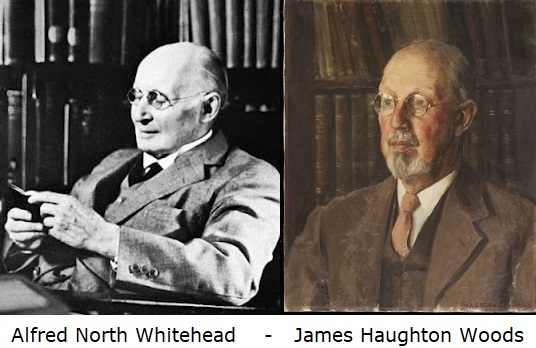
II. The Beginnings of Philosophy
III. The Milesian School
IV. The Pythagoreans
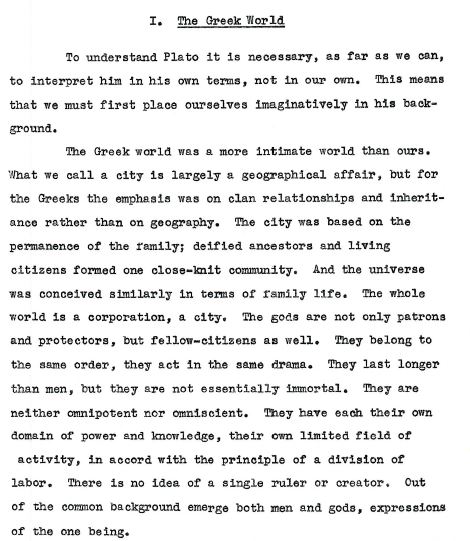
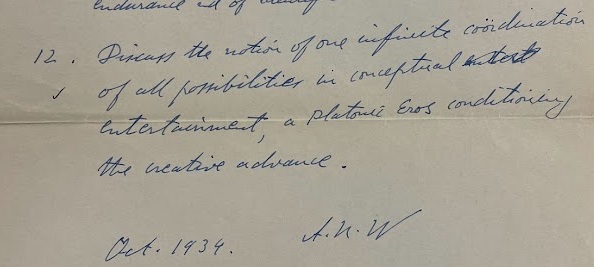
I. The Greek World
To understand Plato it is necessary, as far as we can, to interpret him in his own terms, not in our own. This means that we must first place ourselves imaginatively in his background.
The Greek world was a more intimate world than ours. What we call a city is largely a geographical affair, but for the Greeks the emphasis was on clan relationships and inheritance rather than on geography. The city was based on the permanence of the family; deified ancestors and living citizens formed one close-knit community. And the universe was conceived similarly in terms of family life. The whole world is a corporation, a city. The gods are not only patrons and protectors, but fellow-citizens as well. They belong to the same order, they act in the same drama. They last longer than men, but they are not essentially immortal. They are neither omnipotent nor omniscient. They have each their own domain of power and knowledge, their own limited field of activity, in accord with the principle of a division of labor. There is no idea of a single ruler or creator. Out of the common background emerge both men and gods, expressions of the one being.
Religion was much more objective for the orthodox Greek than it is for us, concerned not with an inner struggle but with the portrayal of the contending forces of nature. He was not introspective. He had no word for conscience or for personality. He had no sharp contrasts of body and soul, mind and matter, persons and things. All existence is alive, and has not been broken into categories which then have to be re-introduced to each other. There is no fear of physical pleasure, no distrust of beauty. In fact ‘’beautiful” and ‘”good” are almost indistinguishable, since the essence of both is measure or proportion, a quantitative and external rather than a qualitative ideal, consisting in the avoidance of excess or defect. (This emerges later in Aristotle’s doctrine of the mean.) The good man is he who knows his own limits and keeps within them, playing his allotted role, not encroaching on his neighbor or on the gods. This is his ![]() , or excellence (sometimes mistranslated virtue). Whoever loses this sense of proportion and gets “off side” soon founders. The evil way, when a man is not sure where he is going
, or excellence (sometimes mistranslated virtue). Whoever loses this sense of proportion and gets “off side” soon founders. The evil way, when a man is not sure where he is going ![]() , a “mental aberration” rather than “sin.” The discernment of limits is an affair of intelligence, hence the root of evil is ignorance. Thus arises Socrates’ dictum, “Virtue is knowledge.” You must discover what you are and what the universe allows you, if you would be a good man.
, a “mental aberration” rather than “sin.” The discernment of limits is an affair of intelligence, hence the root of evil is ignorance. Thus arises Socrates’ dictum, “Virtue is knowledge.” You must discover what you are and what the universe allows you, if you would be a good man.
Physical laws are like moral laws, and there is cosmic as well as social order, the balance, and rhythm of interacting natural forces. The air, the earth, the sea, the blue sky seemed more alive than man himself; the Greeks called them gods. The Greeks were an agricultural people, not nomads; they observed the seasons, and were aware of the long sequences of nature; they expressed their ideas in sun myths rather than in animal fables. Like all of us, they saw things in accord with their value, in group-relations; these universals are the Olympian gods# who are symbols rather than portraits. These gods manifest the Greek sense of form, a kind of incipient geometry. They are the guardians of order, and at the same time they embody the satisfaction of human desires. They are perfected human beings, living lives similar to man’s life and with identical moral standards, but released from struggle and from suffering. Like man, they have their limits and they assign limits. This is justice, and to transgress it is ![]() – insolence and defiance of nature. The gods display only a remote interest in human individuals, and they are the protectors of human institutions and civilization. They also safeguard the order of the universe, keeping things in their places and seeing to it that the world does not cave in. They are images of perfection, types of permanence and clarity, “representatives of all that is definite, clear-cut, serene, lasting.”
– insolence and defiance of nature. The gods display only a remote interest in human individuals, and they are the protectors of human institutions and civilization. They also safeguard the order of the universe, keeping things in their places and seeing to it that the world does not cave in. They are images of perfection, types of permanence and clarity, “representatives of all that is definite, clear-cut, serene, lasting.”
The worship of the Olympian gods was the “established church”, maintained by rulers, patricians, intellectuals, and by all who insisted on the prevailing order and wished no change. But underneath the serene sense of order characteristic of the Olympian view there is a dark counter-current, the protest of the less fortunate – the simple-minded, ignorant, or unsuccessful. These are impressed not so much by the continuities as by the interruptions (failure, death, disaster, etc.). They are interested not in the nature of the cosmos nor in an abstract perfection, but in present suffering and in the instinctive effort to find escape from evils in the expansion of life. For them the Olympian gods are too remote, too impersonal, lifted too high above the plane of human suffering. ’’The gods”, says Hermes in Prometheus Bound, ‘’know not the meaning of the word alas!” Prometheus is a symbol of a different conception, the god who understands man’s pain because he too suffers, and who fights against odds with the hope of ultimate victory.
In primitive religions, continuity of life is assumed without question. The body is a temporary station for the soul, and death is a mere wavering in the unbroken family life. Both Romans and Greeks had the conception of a family soul in which all shared; this is connected with ancestor worship. Justice may be served not only by the hope of a future requital, but also by the reference of evil to the past. Then misery is seen as expiation for past wrong-doing, either in one’s own previous incarnations or in the history of the family. This easily combines with the idea of the Golden Age, and the reversal of our notion of progress.
The Olympians, happy in the established arrangement of things, turned their backs on the problems of death and change, and were apathetic toward ideas of immortality and and reincarnation. But the unsatisfied plebeian, not finding happiness or beauty in this life, and clinging to the expectation of a personal redemption, projected a future where evils would be remedied, and inferred an exuberance of life beyond its interruptions. These longings round a language in the worship of the fertility and infinite life of nature. Crop, vine, and tree die, rising triumphant in the spring; so man goes down into dust in one generation, and is re-animated in the next. Symbolic movements, ceremonial dances, chants without words, and later folk-songs, expressed the strong animal emotions latent in us all, joy in the escape from limitations and exultation in the fullness of the life to come. The primitive cult of Demeter, goddess of the earth, and Persephone, her daughter (originally outsiders, later adopted into the Olympian family), was a dramatic portrayal of the sequence or the seasons; it formed the basis of the Eleusinian Mysteries. But it is Dionysus who is par excellence the typical Mystery god. His worship originated in Thrace; Orphism later revived it, celebrating his death and restoration to life which held out the promise of man* s final triumph over suffering. The vine around his brow symbolizes the renewal of our depleted forces. The satyrs in his train, half-men, half-animals, express our oneness with the inexhaustible fertility of nature. Thus terror over the isolation and incompleteness of mere individuality is lost in the feeling that suffering may be pooled and thereby disposed of. The individual immerses himself in the vast reservoir of aggregate life, that life at the heart of things which is forever indestructible and joyous. This easily passed over into Pantheism, and in turn into the Augustinian philosophy.
For the Olympian the moral ideal was the balanced development and free functioning of all the attributes of the natural man within the limits of his human finitude; all impulses are good so long as they live happily together and do not overstep their boundaries. The Dionysian was more subjective, more ascetic, more austere, more mystical. He resigned himself to present woes in the anticipation of future redemption; and he sought to break the attachment of soul to body, to transcend the human lot, in order that the mortal might partake of and be re-born in the life of the god.
Both are movements outward from the mere present; the Olympian in the direction of explanation, the Dionysian in the direction of emotional expansion and enlargement. The Olympian might be called a scientist; the Dionysian is rather a dramatist, and it is the primitive dances and choral songs in honor of Dionysus which were the source of Greek tragedy. The great epic poets were Olympian. Both types can be found among the philosophers. Pythagoras worked up the Dionysian point of view; as did the Stoics, who doubted the possibility of perfection, emphasized struggle, and taught that present pleasure should be sacrificed for the sake of a future good. The Olympian strain Is represented by the Epicureans, whose gods in the intersteller spaces are unaware of dissonances, free from all contact with the world in enshrined perfection. With Aristotle the Olympian theology has been focussed into a single perfect god, motionless but the end of all motion, oblivious of the world which strives toward him. (Not “God so loved the world” but ’’the world so loved God” migjht be said of him.) Both Olympian and Dionysian are exemplified in the philosophy of Plato.
STUDENT NOTES FROM WHITEHEADS’ LECTURES ON PLATO’S FORERUNNERS
II. The Beginnings of Philosophy
III. The Milesian School
IV. The Pythagoreans
